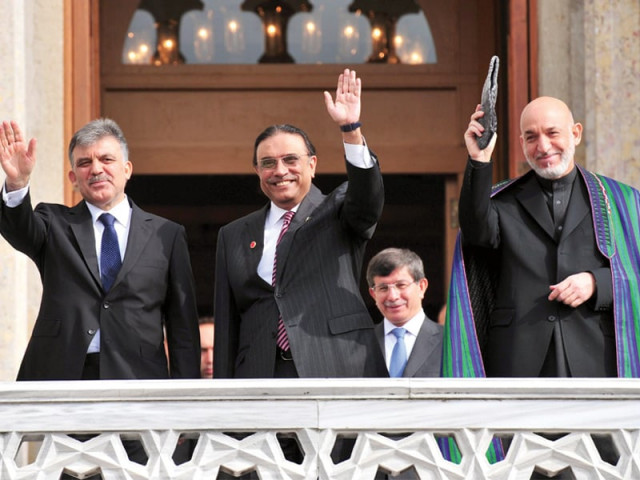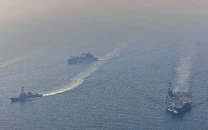Trilateral summit: Agreements, but no breakthrough in Istanbul
Pakistan will assist in Burhanuddin Rabbani’s murder probe.

During the trilateral summit, it was decided that a “joint mechanism” would be evolved to investigate the assassination of Burhanuddin Rabbani, Afghanistan’s top peace maker by an alleged Taliban emissary – an incident that has caused immense distrust in relations between the two neighbours.
However, Afghan President Hamid Karzai’s comments suggested the two were far from resolving their differences despite three-way talks between the presidents of Afghanistan, Pakistan and Turkey.
“We have been hurt badly, our desire for peace has been either misunderstood or misused and we have learnt a lesson from the manner in which we pursued the peace process,” Karzai said.
Speaking at a press conference followed by the summit in Istanbul, Afghan President Hamid Karzai again ruled out peace talks with the Taliban until he knew how to contact the group, saying that until then Afghanistan would talk only to Pakistan.
“We cannot keep talking to suicide bombers, therefore we have stopped talking about talking to the Taliban until we have an address for the Taliban ... until that day we have said we will be talking to our brothers in Pakistan to find a solution to the problem that we have,” Karzai said.
The summit was dominated by Afghanistan’s push for Pakistan to “move beyond words” and take concrete steps to curb militants which it said were a threat to both countries. The two neighbours were holding their first talks since the assassination of the chief Afghan peace negotiator.
Afghan President Karzai and his Pakistani counterpart Asif Ali Zardari met along with Turkish President Abdullah Gul while their army chiefs also consulted.
During a press briefing following the talks, President Zardari cautioned that there was a need for a regional solution to the Afghanistan issue, adding that the situation was very complex and no quick results should be expected.
The leaders also discussed possibility of forming a Commission at Foreign Ministers’ level to identify problems confronting the region, preparing a programme for their resolution and ensuring follow up.
Afghan Deputy Foreign Minister Jawed Ludin told reporters on the sidelines of the meeting in Istanbul that Afghanistan and Pakistan had been trying for several years to build trust “but I think we have failed to see results on the ground”.
“So we are at a stage where we need to move beyond words, beyond expressions of commitments. We need to get to a stage where we actually do concrete things that will address our concerns with regards to our security,” he said.
Ludin said Islamabad’s cooperation was vital to the security of Afghanistan but also to Pakistan - which has also faced a wave of bombings by the Pakistani Taliban.
“So the message we are really bringing today is to tell Pakistan, ‘Look, you’re not doing us a favour by helping with bringing peace and security to Afghanistan ... It’s a question of peace and security in Pakistan that’s also suffering at the hands of terrorism.’”
On Tuesday, Karzai’s spokesman reiterated Afghan concerns that Pakistan was supporting the militants. “President Karzai’s message is that Pakistan needs to end using radicalism as a tool in their politics,” said Emal Fayzi.
Three agreements were also signed during the trilateral summit. One agreement pertained to a currency Swap between Pakistan and Turkey, which was signed by Governor of State Bank of Pakistan Yaseen Anwar and Governor Central Bank of Turkey Dr Erdem Basci on behalf of their respective countries. An agreement on joint military training and exercises between the militaries of Pakistan, Turkey and Afghanistan was signed by Chief of Army Staff General Ashfaq Parvez Kayani from Pakistan, General Necdet Ozal from Turkey and General Shah Muhammad Kairimi from Afghanistan.
The third agreement also pertained to training cooperation. It was signed by Pakistan’s Interior Minister Rehman Malik, Turkish Interior Minister Idress Naeem Shaheen and Afghan Interior Minister Bismillah Khan Muhammadi.
The trilateral talks will be followed by a regional conference on Afghanistan to be attended by Indian Foreign Minister SM Krishna, Pakistani Foreign Minister Hina Rabbani Khar and their counterparts from France and Germany, among others.
US Secretary of State Hillary Clinton cancelled her trip because of the ill health of her mother.
Published in The Express Tribune, November 2nd, 2011.



















COMMENTS
Comments are moderated and generally will be posted if they are on-topic and not abusive.
For more information, please see our Comments FAQ